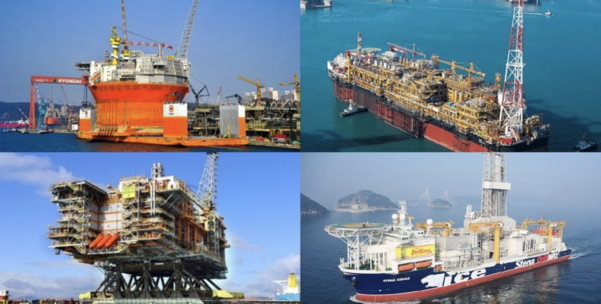Input 2021.01.19 11:00
Shale gas is a variable… Even skepticism that “the past boom will not come”
As oil prices have recently rebounded, expectations for offshore plant orders from the domestic shipbuilding industry are growing. Offshore plants are equipment for exploration, drilling, excavation, and production of oil and gas buried in the seafloor. The price is usually large in units of trillions, but orders cannot be ordered until the oil price exceeds a certain level. However, there is also a’new opinion’ that it is uncertain whether the order volume will be released this year due to the prolonged aftermath of the development of shale gas and the new coronavirus infection (Corona 19).
According to the oil refining industry on the 19th, the prices of Dubai Oil, North Sea Brent Oil, and Western Texas Crude Oil (WTI), which are the world’s three largest oil types, have been rising rapidly in recent months. According to Korea National Oil Corporation’s Oil Price Information Service Ofinet, the prices of the three oil types as of the 15th were $55.39, $55.10, and $52.36, respectively. This is due to expectations for economic recovery, weak dollar, and a decrease in US crude oil inventories following the development of a COVID-19 vaccine and treatment.

Last year’s sluggish offshore plant orders were also attributed to international oil prices. Last year, international oil prices plummeted as demand for crude oil declined due to the corona19. Among the three domestic shipbuilders last year, the one that won an offshore plant order Korea Shipbuilding & Marine Engineering (009540)There was only one.
An official from the shipbuilding industry said, “It remains to be seen how much more oil prices will rise this year, but once oil prices rise, the likelihood of ordering offshore plants increases.” On the 17th, the Bank of Korea predicted that “international oil prices will lead the rise in raw material prices in the future amid OPEC+ production cuts and US shale production slowdown” in a report titled’Recent International Raw Material Price Rise Background and Prospect.’
The shipbuilding industry is preparing to win orders for floating crude oil production storage and handling facilities (FPSO) for the Bongga offshore project in Nigeria and floating offshore production facilities (FPU) for the Jansio project in Australia. Looking at past orders, it is possible to aim for orders worth about 1 trillion won to 2 trillion won. There is a possibility that the Norwegian state-owned oil company Equinor will place an order for FPSO, but it is uncertain as a final decision on the design has not yet been made.
As the three major domestic shipbuilders are nearing the end of their offshore projects, the cliffs of Ilgam have become visible. The cliff of work is highly likely to lead to unemployment of employees of partner companies. Geoje City was concerned that up to 8,000 people could be unemployed if shipyards did not secure work for offshore plants this year.
The variable is shale gas. If oil production on land increases due to the development of shale gas, offshore plant investment will inevitably shrink. According to the industry, the appropriate price for the shale gas industry to meet profitability is around $50 per barrel, which is not much different from an offshore plant.
An official from the shipbuilding industry said, “The reason that the domestic shipbuilding industry made a lot of money from winning orders for offshore plants in 2011-2013 was because international oil prices soared to $100 per barrel before the shale revolution took place.” It is difficult to expect, and the key is how quickly the global economy will recover from the aftermath of Corona 19 this year.”
